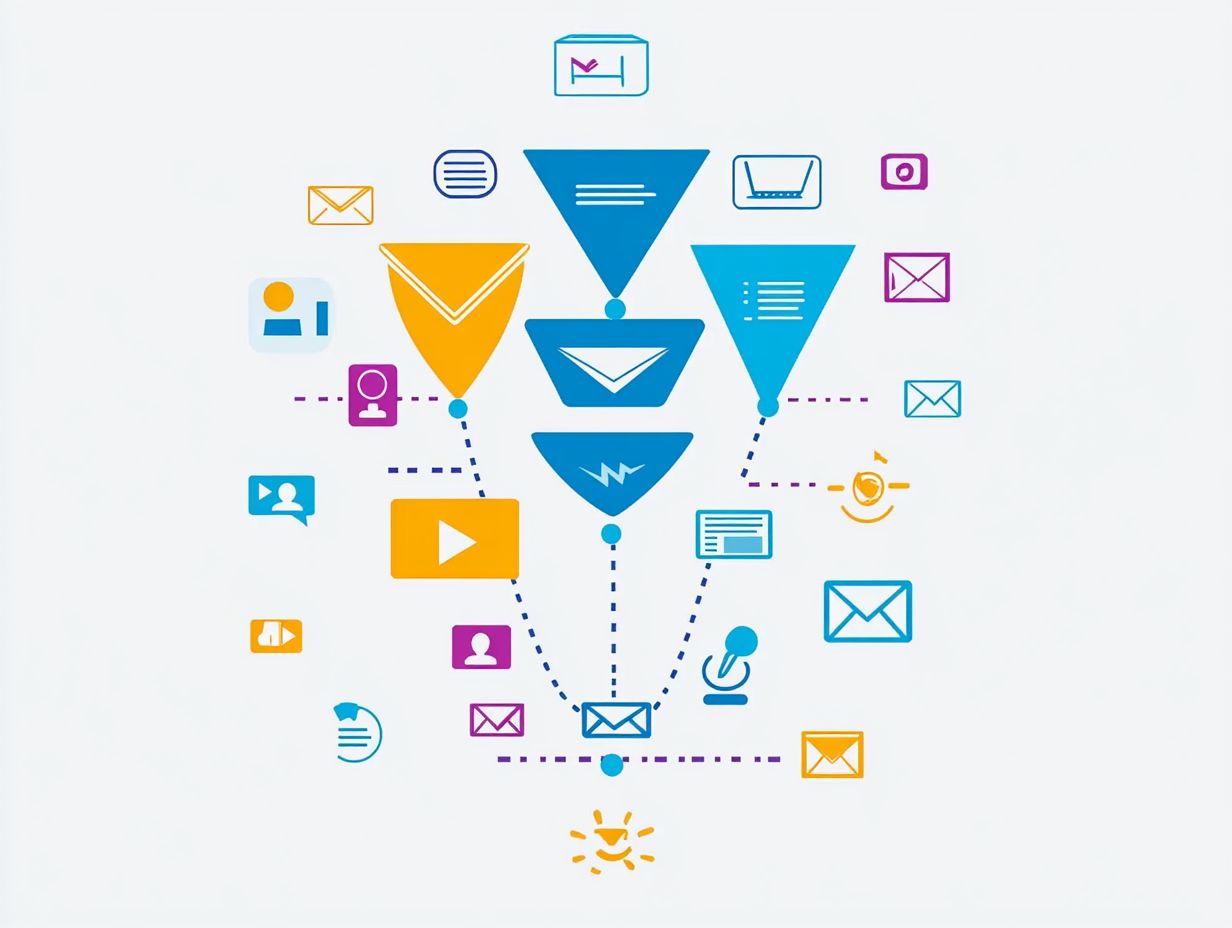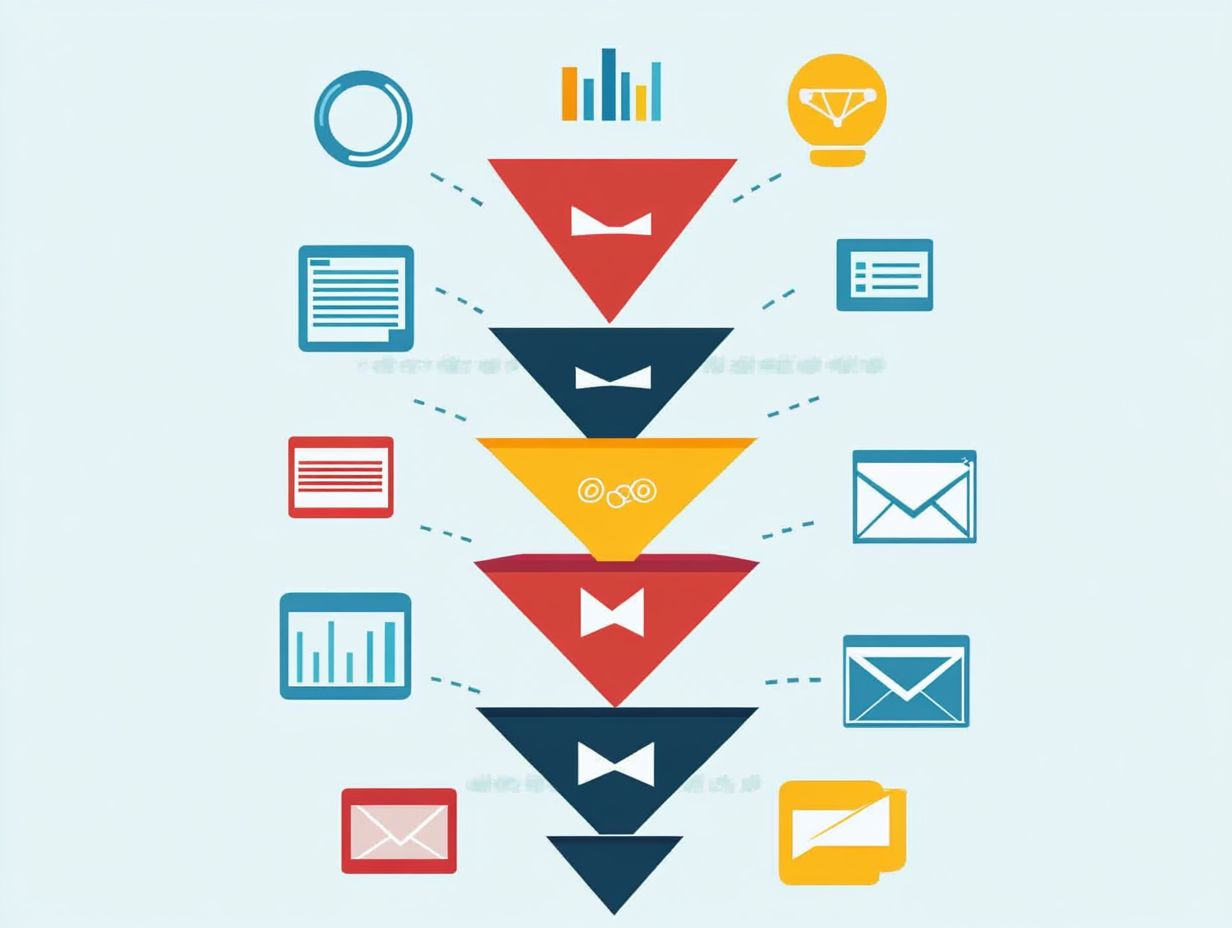Understanding the Basics of Lead Scoring
Let's Set Up Your Lead Generation Strategy
Fill out the form below, and our team will get in touch with you to create a tailored solution for your business.
In the dynamic arena of sales and marketing, lead scoring an indispensable tool for businesses keen on effectively prioritizing their prospects emerges as a method that impacts both sales and marketing.
By evaluating potential customers against specific criteria, you can concentrate your efforts on leads that are more inclined to convert.
This guide delves into the intricacies of lead scoring: its definition, significance, essential components, and best practices.
Whether you re aiming to fine-tune your approach or navigate common challenges, this guide offers invaluable insights to elevate your strategy!
Contents [hide]
- Key Takeaways:
- What is Lead Scoring?
- Let's Set Up Your Lead Generation Strategy
- Why is Lead Scoring Important?
- Components of Lead Scoring
- Let's Set Up Your Lead Generation Strategy
- How to Develop a Lead Scoring Model
- Best Practices for Lead Scoring
- Challenges and Solutions in Lead Scoring
- Let's Set Up Your Lead Generation Strategy
- Frequently Asked Questions
Key Takeaways:

- Lead scoring is a method of ranking and prioritizing potential customers based on their likelihood to convert into a sale.
- Effective lead scoring can significantly improve sales and marketing efforts by focusing resources on leads with the highest potential for conversion.
- A successful lead scoring model considers both qualitative factors, such as behavior and interests, and quantitative factors, such as demographics and budget, to accurately assess lead quality.
What is Lead Scoring?
Lead scoring serves as a refined strategy that gives your marketing team the power to assess and rank sales leads according to their potential for conversion into loyal customers.
This approach enhances your lead management process significantly.
By employing a scoring model, you analyze an array of criteria, including lead quality, customer profile, buyer readiness, and how engaged they are.
This enables you to identify which leads are most poised for positive engagement and conversion, ultimately streamlining your efforts for maximum impact.
Definition and Purpose
Lead scoring is all about assigning numerical values to prospects based on their engagement levels and how well they align with your target audience.
This approach gives your marketing team the power to nurture leads more effectively and prioritize those that matter most.
By implementing this systematic method, you not only streamline your sales pipeline but also enable your team to focus their energies on high-potential leads.
Analyzing various scoring criteria such as website interactions, email responses, and social media engagement allows you to gain a clearer understanding of which leads are primed for conversion.
Engagement scores, in particular, are vital for evaluating a prospect’s interest and readiness to make a purchase.
Ultimately, effective lead scoring helps your business nurture qualified leads through proper lead nurturing, which is the process of building relationships with potential customers.
Let's Set Up Your Lead Generation Strategy
Fill out the form below, and our team will get in touch with you to create a tailored solution for your business.
This ensures that resources are directed towards those with the highest chances of success, thereby boosting overall sales productivity.
Why is Lead Scoring Important?
Lead scoring is essential as it elevates the efficiency of your sales and marketing endeavors.
By honing in on high-quality leads, your teams can concentrate their efforts where they matter most!
This focus not only enhances conversion rates but also boosts overall sales productivity key components of a successful marketing strategy that includes account-based marketing.
Benefits and Impact on Sales and Marketing
The benefits of lead scoring go well beyond merely prioritizing sales leads; it profoundly impacts the effectiveness of marketing teams.
Lead scoring streamlines the entire sales process by deepening your understanding of customer touchpoints and prospective customers.
By identifying which leads are most likely to convert, enhance your targeting strategies today!
This includes scoring criteria that help in crafting messages that truly resonate with potential customers.
This focused approach allows for better resource allocation, enabling your teams to concentrate their efforts on high-quality leads, such as hot leads, which ultimately drives a higher return on investment.
Lead scoring allows for better predictions of customer behavior, paving the way for personalized engagement that aligns marketing and sales efforts seamlessly.
As a result, you re likely to see an increase in sales acceptance rates, boosting your overall revenue and cultivating stronger customer relationships.
Start implementing lead scoring now to see immediate benefits!
Components of Lead Scoring

The components of lead scoring include various qualitative and quantitative factors that shape an effective scoring model. This model enhances predictive lead scoring, allowing you to forecast sales success and revenue forecasts more accurately.
Qualitative and Quantitative Factors
Qualitative and quantitative factors are the foundation of effective lead scoring. Qualitative factors relate to how leads interact and behave, while quantitative factors focus on scoring criteria such as firm revenue, demographic data, and information about the company s characteristics.
Let's Set Up Your Lead Generation Strategy
Fill out the form below, and our team will get in touch with you to create a tailored solution for your business.
Understanding engagement scores, social media interactions, and personal connections alongside hard data like demographic and firmographic details significantly enhances your lead evaluation process. Qualitative aspects, such as frequency and depth of interactions, provide valuable insights into customer alignment and brand affinity.
Integrating these elements into your scoring models refines your approach, ensuring your focus remains on leads that are both financially promising and likely to convert due to an established rapport and interest in your marketing strategy. This perspective boosts lead quality, fostering a more targeted and effective marketing strategy.
How to Develop a Lead Scoring Model
Developing a lead scoring model requires a strategic approach, unfolding through a carefully crafted step-by-step guide with integrated marketing automation. Get ready to explore a guide packed with various scoring algorithms tailored to fit your unique lead management process and organizational levels.
Step-by-Step Guide
Crafting an effective lead scoring model begins with defining your scoring criteria and harnessing marketing automation tools. It is also essential to ensure robust sales follow-up to enhance lead tracking.
Start by gathering relevant data from various sources, such as website interactions, email engagement, and social media activity. This data will provide valuable insights into your leads behaviors and preferences.
Next, establish scoring criteria that include both demographic attributes and behavioral indicators. This approach allows for a more nuanced assessment of each lead’s potential.
By implementing marketing automation tools, you can streamline the scoring process, continuously updating lead scores based on interactions.
Finally, collaboration between your sales and marketing teams is crucial for refining this model. Their combined insights help ensure that your criteria remain relevant and actionable, ultimately fostering a more efficient lead nurturing pipeline.
Best Practices for Lead Scoring
Your best practices for lead scoring should focus on implementing effective strategies. This ensures the establishment of a robust scoring system, enabling seamless collaboration between your sales and marketing teams to achieve optimal results.
Tips for Effective Implementation

Effective implementation of lead scoring requires your attention on lead tracking, establishing clear scoring best practices, and continuously measuring key metrics like customer lifetime value (the total revenue a customer brings during their relationship with your business) and sales acceptance rates.
Additionally, keep a close eye on how leads engage with your marketing content across various channels. By setting up a robust system to monitor engagement levels, you can uncover valuable insights into which strategies resonate with potential customers.
Adapting your scoring practices based on real-time feedback sharpens the accuracy of your lead assessments and elevates your overall conversion rates. Regularly reviewing these metrics ensures that your scoring model evolves with market dynamics, making it an integral and dynamic part of your sales approach.
Start refining your lead scoring model today to maximize your sales potential!
Challenges and Solutions in Lead Scoring
Challenges in lead scoring frequently stem from common roadblocks that diminish the effectiveness of your lead management strategies. However, with the right solutions in place, you can effectively navigate these obstacles and enhance your lead management process.
Let's Set Up Your Lead Generation Strategy
Fill out the form below, and our team will get in touch with you to create a tailored solution for your business.
Common Roadblocks and How to Overcome Them
Common roadblocks in lead scoring can arise from misalignment between your sales team and marketing team, not enough good data, and unclear scoring criteria. These challenges are not insurmountable. They can be effectively addressed through better teamwork and enhanced collaboration between sales and marketing.
To tackle these obstacles, it s essential to foster ongoing dialogue and mutual understanding between the two departments. Regular meetings can serve as a platform for sharing insights, aligning strategies, and creating a unified vision for lead scoring.
To improve data quality, prioritize effective data collection methods along with utilizing analytics tools to extract actionable insights.
Establish clear and transparent scoring criteria for lead quality. Collaboratively develop a lead scoring model that leverages behavioral data and demographic data. This will align with the goals and objectives of both sales and marketing teams, ensuring everyone understands the metrics used to evaluate prospective customers and their engagement score.
Frequently Asked Questions
What is lead scoring and why is it important?
Lead Scoring is the process of assigning a numerical value or score to potential customers based on their lead interactions. It is important because it helps sales teams and marketing teams prioritize and focus their efforts on the most promising sales leads.
How does lead scoring work?

Lead scoring works by tracking and evaluating a lead’s actions, such as customer touchpoints and social media interactions like website visits, email opens, form submissions, and more. These actions are assigned point values, and once a lead reaches a certain score, they are considered a qualified lead and passed to the relevant team for sales follow-up.
What are the benefits of using lead scoring?
Lead scoring allows companies to better understand their target audience and lead nurturing practices. This enables them to target leads with personalized and relevant messaging. It also helps teams save time and resources by focusing on leads that are more likely to convert into customers, thus increasing conversion rates.
What factors are typically used in lead scoring?
The scoring criteria used in lead scoring may vary depending on the company and industry, often including firmographic data and score thresholds. Common criteria include demographic information, website engagement, email engagement, social media interactions, and past interactions with the company.
Can lead scoring be automated?
Yes, lead scoring can be automated using Marketing Automation tools to enhance sales productivity. This allows for a more efficient and consistent scoring process, as well as the ability to adjust and refine scoring criteria over time.
How often should lead scoring be reviewed and updated?
Lead scoring should be regularly reviewed and updated, especially as your company and target audience evolve. Regularly assess your scoring criteria to keep things accurate and relevant, ensuring your lead scoring model aligns with scoring best practices.
Are you ready to transform your lead scoring process and boost your sales? Contact us for more information!






